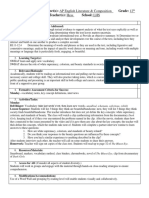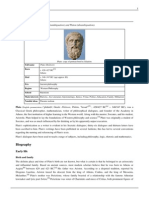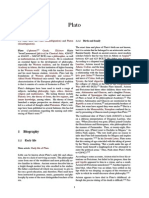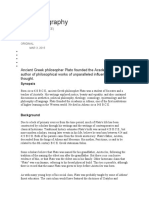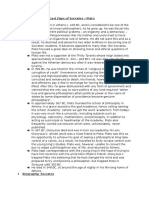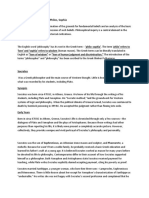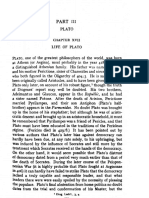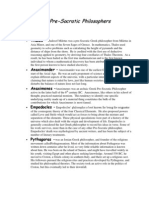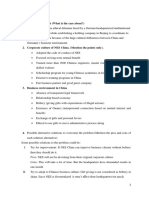Professional Documents
Culture Documents
Plato (: Republic Laws
Plato (: Republic Laws
Uploaded by
Han Hiu0 ratings0% found this document useful (0 votes)
14 views2 pagesPlato was an influential ancient Greek philosopher born between 429-423 BC in Athens. He founded the Academy in Athens, the first institution of higher learning in Western civilization. Along with his teacher Socrates and student Aristotle, Plato is considered a foundational figure of Western philosophy and science. He authored philosophical works in the form of written dialogues that examined ethical, political, and metaphysical issues and transformed intellectual thought. Plato came from an aristocratic family in Athens and belonged to the same social circles as prominent political figures of his time.
Original Description:
Plato
Original Title
Plato
Copyright
© © All Rights Reserved
Available Formats
DOCX, PDF, TXT or read online from Scribd
Share this document
Did you find this document useful?
Is this content inappropriate?
Report this DocumentPlato was an influential ancient Greek philosopher born between 429-423 BC in Athens. He founded the Academy in Athens, the first institution of higher learning in Western civilization. Along with his teacher Socrates and student Aristotle, Plato is considered a foundational figure of Western philosophy and science. He authored philosophical works in the form of written dialogues that examined ethical, political, and metaphysical issues and transformed intellectual thought. Plato came from an aristocratic family in Athens and belonged to the same social circles as prominent political figures of his time.
Copyright:
© All Rights Reserved
Available Formats
Download as DOCX, PDF, TXT or read online from Scribd
Download as docx, pdf, or txt
0 ratings0% found this document useful (0 votes)
14 views2 pagesPlato (: Republic Laws
Plato (: Republic Laws
Uploaded by
Han HiuPlato was an influential ancient Greek philosopher born between 429-423 BC in Athens. He founded the Academy in Athens, the first institution of higher learning in Western civilization. Along with his teacher Socrates and student Aristotle, Plato is considered a foundational figure of Western philosophy and science. He authored philosophical works in the form of written dialogues that examined ethical, political, and metaphysical issues and transformed intellectual thought. Plato came from an aristocratic family in Athens and belonged to the same social circles as prominent political figures of his time.
Copyright:
© All Rights Reserved
Available Formats
Download as DOCX, PDF, TXT or read online from Scribd
Download as docx, pdf, or txt
You are on page 1of 2
Plato (/ˈpleɪtoʊ/;[a][1] Ancient Greek: Πλάτων[a] Plátōn, pronounced [plá.
tɔːn] in Classical Attic;
428/427 or 424/423[b] – 348/347 BC) was a philosopher in Classical Greece and the founder of
the Academy in Athens, the first institution of higher learning in the Western world. He is widely
considered the most pivotal figure in the development of philosophy, especially the Western
tradition.[2] Unlike nearly all of his philosophical contemporaries, Plato's entire work is believed to
have survived intact for over 2,400 years.[3] Others believe that the oldest extant manuscript
dates to around AD 895, 1100 years after Plato's death. This makes it difficult to know exactly
what Plato wrote.[4][5]
Along with his teacher, Socrates, and his most famous student, Aristotle, Plato laid the
foundations of Western philosophy and science.[6] Alfred North Whitehead once noted: "the safest
general characterization of the European philosophical tradition is that it consists of a series of
footnotes to Plato."[7] In addition to being a foundational figure for Western science, philosophy,
and mathematics, Plato has also often been cited as one of the founders of Western
religion and spirituality.[8]
Plato was the innovator of the written dialogue and dialectic forms in philosophy. Plato appears
to have been the founder of Western political philosophy, with his Republic, and Laws among
other dialogues, providing some of the earliest extant treatments of political questions from a
philosophical perspective. Plato's own most decisive philosophical influences are usually thought
to have been Socrates, Parmenides, Heraclitusand Pythagoras, although few of his
predecessors' works remain extant and much of what we know about these figures today derives
from Plato himself.[9]
The Stanford Encyclopedia of Philosophy describes Plato as "...one of the most dazzling writers
in the Western literary tradition and one of the most penetrating, wide-ranging, and influential
authors in the history of philosophy. ... He was not the first thinker or writer to whom the word
“philosopher” should be applied. But he was so self-conscious about how philosophy should be
conceived, and what its scope and ambitions properly are, and he so transformed the intellectual
currents with which he grappled, that the subject of philosophy, as it is often conceived—a
rigorous and systematic examination of ethical, political, metaphysical,
and epistemological issues, armed with a distinctive method—can be called his invention. Few
other authors in the history of Western philosophy approximate him in depth and range: perhaps
only Aristotle (who studied with him), Aquinas and Kant would be generally agreed to be of the
same rank
The exact time and place of Plato's birth are unknown, but it is certain that he belonged to an
aristocratic and influential family. Based on ancient sources, most modern scholars believe that
he was born in Athens or Aegina[c] between 429 and 423 BC. His father was Ariston. According to
a disputed tradition, reported by Diogenes Laertius, Ariston traced his descent from the king of
Athens, Codrus, and the king of Messenia, Melanthus.[11] Plato's mother was Perictione, whose
family boasted of a relationship with the famous Athenian lawmaker and lyric
poet Solon.[12]Perictione was sister of Charmides and niece of Critias, both prominent figures of
the Thirty Tyrants, the brief oligarchic regime, which followed on the collapse of Athens at the
end of the Peloponnesian War (404–403 BC).[13] Besides Plato himself, Ariston and Perictione
had three other children; these were two sons, Adeimantus and Glaucon, and a
daughter Potone, the mother of Speusippus (the nephew and successor of Plato as head of his
philosophical Academy).[13] The brothers Adeimantus and Glaucon are mentioned in
the Republic as sons of Ariston,[14] and presumably brothers of Plato, but some have argued they
were uncles.[15] But in a scenario in the Memorabilia, Xenophon confused the issue by presenting
a Glaucon much younger than Plato.[16]
The traditional date of Plato's birth (428/427) is based on a dubious interpretation of Diogenes
Laertius, who says, "When [Socrates] was gone, [Plato] joined Cratylus the Heracleitean and
Hermogenes, who philosophized in the manner of Parmenides. Then, at twenty-eight,
Hermodorus says, [Plato] went to Euclides in Megara." As Debra Nails argues, "The text itself
gives no reason to infer that Plato left immediately for Megara and implies the very
opposite."[17] In his Seventh Letter, Plato notes that his coming of age coincided with the taking of
power by the Thirty, remarking, "But a youth under the age of twenty made himself a
laughingstock if he attempted to enter the political arena." Thus, Nails dates Plato's birth to
424/423.[18]
According to some accounts, Ariston tried to force his attentions on Perictione, but failed in his
purpose; then the god Apollo appeared to him in a vision, and as a result, Ariston left Perictione
unmolested.[19] Another legend related that, when Plato was an infant, bees settled on his lips
while he was sleeping: an augury of the sweetness of style in which he would discourse about
philosophy.[20]
Ariston appears to have died in Plato's childhood, although the precise dating of his death is
difficult.[21] Perictione then married Pyrilampes, her mother's brother,[22] who had served many
times as an ambassador to the Persian court and was a friend of Pericles, the leader of the
democratic faction in Athens.[23] Pyrilampes had a son from a previous marriage, Demus, who
was famous for his beauty.[24] Perictione gave birth to Pyrilampes' second son, Antiphon, the half-
brother of Plato, who appears in Parmenides.[25]
In contrast to reticence about himself, Plato often introduced his distinguished relatives into his
dialogues, or referred to them with some precision: Charmides has a dialogue named after him;
Critias speaks in both Charmides and Protagoras; and Adeimantus and Glaucon take prominent
parts in the Republic.[26] These and other references suggest a considerable amount of family
pride and enable us to reconstruct Plato's family tree. According to Burnet, "the opening scene of
the Charmides is a glorification of the whole [family] connection ... Plato's dialogues are not only
a memorial to Socrates, but also the happier days of his own family."[27]
You might also like
- Bluest Eye LessonDocument1 pageBluest Eye Lessonapi-391214969No ratings yet
- Plato Politicl ThoughtsDocument25 pagesPlato Politicl ThoughtsnaviNo ratings yet
- Plato (: PlátōnDocument3 pagesPlato (: PlátōnRegie Rey AgustinNo ratings yet
- IndexDocument22 pagesIndexAbhisek MukherjeeNo ratings yet
- PlatoDocument25 pagesPlatodonNo ratings yet
- AARONDocument6 pagesAARONapi-26570979No ratings yet
- Plato: Navigation SearchDocument33 pagesPlato: Navigation SearchhappyminiNo ratings yet
- Plato (Pronounced /ˈpleɪtoʊ/, Greek: Πλάτων, Plátōn, "Broad" (2) ;Document4 pagesPlato (Pronounced /ˈpleɪtoʊ/, Greek: Πλάτων, Plátōn, "Broad" (2) ;dilmirNo ratings yet
- Plato NeoplatonismDocument34 pagesPlato NeoplatonismIvo IvoNo ratings yet
- Plato 1Document3 pagesPlato 1NatalijaNo ratings yet
- PLATO BiographyDocument4 pagesPLATO Biographyjustine joi WrightNo ratings yet
- Plato BiographyDocument7 pagesPlato BiographyBlanca Lucía Hernández FletscherNo ratings yet
- Plato - Internet Encyclopedia of PhilosophyDocument25 pagesPlato - Internet Encyclopedia of PhilosophyAnonymous 4tdjVwylFXNo ratings yet
- Plato - WikipediaDocument69 pagesPlato - WikipediaMir AD BalochNo ratings yet
- Dialogues of Plato - Alexander WilderDocument103 pagesDialogues of Plato - Alexander WilderMark R. JaquaNo ratings yet
- SocratesDocument10 pagesSocratesarvin paruliNo ratings yet
- Socrates BiographyDocument4 pagesSocrates BiographyScribdTranslationsNo ratings yet
- History of PlatoDocument2 pagesHistory of PlatoNicole MarianoNo ratings yet
- TutuhjanDocument5 pagesTutuhjanMildred ValentinoNo ratings yet
- Political Science AssingDocument18 pagesPolitical Science AssingBataungi Nahi MainNo ratings yet
- Plato BiographyDocument3 pagesPlato Biographyandreikarl2104No ratings yet
- Plato and SocratesDocument7 pagesPlato and SocratesNiel S. DefensorNo ratings yet
- JURISPRUDENCEDocument5 pagesJURISPRUDENCEPranav SharmaNo ratings yet
- Social Science and PhilosophyDocument20 pagesSocial Science and PhilosophyPauline Ermeje GozoNo ratings yet
- Plátōn, "Broad" : PlatoDocument2 pagesPlátōn, "Broad" : PlatoHanelizan Ert RoadNo ratings yet
- Biography Inventions Fun Facts: Plato, (Born 428/427 Bce, Athens, Greece-DiedDocument3 pagesBiography Inventions Fun Facts: Plato, (Born 428/427 Bce, Athens, Greece-DiedRaquel Dela CruzNo ratings yet
- The Apology & The Eumenides U4AOS2Document6 pagesThe Apology & The Eumenides U4AOS2dlgirNo ratings yet
- SocratesDocument15 pagesSocratesVishal SawhneyNo ratings yet
- PLATO The Great Philosopher & His ContributionDocument1 pagePLATO The Great Philosopher & His ContributionbiplobNo ratings yet
- Heracleitus Cosmology SocratesDocument5 pagesHeracleitus Cosmology SocratesAlessandra VittiNo ratings yet
- Philoooooooooooo!Document70 pagesPhiloooooooooooo!Maria MacelNo ratings yet
- History of ScienceDocument6 pagesHistory of Scienceabdulbasitabdulsalam19No ratings yet
- Legendary Philosophers: The Life and Philosophy of PlatoFrom EverandLegendary Philosophers: The Life and Philosophy of PlatoNo ratings yet
- Plato - The RepublicDocument569 pagesPlato - The RepublicGesana BitiNo ratings yet
- Socrates Unfold PDFDocument569 pagesSocrates Unfold PDFVidi pinemNo ratings yet
- Plato - The RepublicDocument573 pagesPlato - The RepublicСукновић ИванNo ratings yet
- Feedbooks Book 4104 PDFDocument569 pagesFeedbooks Book 4104 PDFVidi pinemNo ratings yet
- Plato - The RepublicDocument569 pagesPlato - The RepublicstregattobrujaNo ratings yet
- SocratesDocument17 pagesSocratesdonNo ratings yet
- Philosophy and LogicDocument20 pagesPhilosophy and LogicJeffrey MendozaNo ratings yet
- RGS HWPDocument74 pagesRGS HWPdejidoerikajoyNo ratings yet
- Module 2.B - PlatoDocument15 pagesModule 2.B - PlatosbernardoNo ratings yet
- AssignmentDocument3 pagesAssignmentVladimir LegisNo ratings yet
- Philosophic Classics From Plato To Derrida 6th Edition Baird Test BankDocument35 pagesPhilosophic Classics From Plato To Derrida 6th Edition Baird Test Banksaltinghaughiiphpb100% (32)
- Wikipedia - Platonism, Aristotelianism, and ThomismDocument231 pagesWikipedia - Platonism, Aristotelianism, and ThomismDan Sima67% (3)
- Philosophers: Thales of MiletusDocument7 pagesPhilosophers: Thales of MiletusLorenzOrminitaNo ratings yet
- Research Paper: Introduction To PhilosophyDocument35 pagesResearch Paper: Introduction To PhilosophyFroiland SampianoNo ratings yet
- Biography of Aristotle (Term Paper) : Submitted To: Prof. Randy PonterasDocument3 pagesBiography of Aristotle (Term Paper) : Submitted To: Prof. Randy PonterasDennesse VillasisNo ratings yet
- PLATO Docx-1Document3 pagesPLATO Docx-1granada.carldavid1No ratings yet
- Plato - The RepublicDocument508 pagesPlato - The RepublicfmaurorNo ratings yet
- Plato The RepublicDocument508 pagesPlato The Republicdillon_4021848No ratings yet
- Plato - The RepublicDocument508 pagesPlato - The Republichengchao919No ratings yet
- Plato, Reader, Writer and ProfessorDocument6 pagesPlato, Reader, Writer and ProfessorGiofer BantocNo ratings yet
- Book of Wise Sayings by W. A. CloustonDocument105 pagesBook of Wise Sayings by W. A. Cloustonadelani_oniNo ratings yet
- Human Rights Council Resolution 4/9. Combating Defamation of ReligionsDocument4 pagesHuman Rights Council Resolution 4/9. Combating Defamation of ReligionsRubert CimbalaNo ratings yet
- MicrosoftWord-Tone WordsDocument3 pagesMicrosoftWord-Tone WordsPranjyoti SaikiaNo ratings yet
- Great GatsbyDocument26 pagesGreat GatsbyKasundi FernandoNo ratings yet
- (Downsub - Com) God Hates A Coward - The Greatest Motivational VideoDocument3 pages(Downsub - Com) God Hates A Coward - The Greatest Motivational VideoarcangelNo ratings yet
- Judicial Affidavit (Procopio Dimaano)Document7 pagesJudicial Affidavit (Procopio Dimaano)louis jansenNo ratings yet
- Report FDP 10022014Document9 pagesReport FDP 10022014Kiran Kumar GowdiperuNo ratings yet
- Chapter 1. You The Teacher As A Person in SocietyDocument13 pagesChapter 1. You The Teacher As A Person in SocietyBerlin AlonzoNo ratings yet
- CH03 Managing A Competency Based Approach Hellriegel JacksonDocument33 pagesCH03 Managing A Competency Based Approach Hellriegel JacksonBogdan Valentin Cilia0% (1)
- Contemporary Management 11th Edition Test Bank Chapter 14Document49 pagesContemporary Management 11th Edition Test Bank Chapter 14Manal Al OjailiNo ratings yet
- Law Vs MoralDocument5 pagesLaw Vs MoralNahfa KhoivinaNo ratings yet
- Assignment of Communication SkillsDocument4 pagesAssignment of Communication SkillsNouman Ajmal100% (1)
- Find The Treasure WithinDocument32 pagesFind The Treasure WithinnurNo ratings yet
- NES Case StudyDocument2 pagesNES Case Studysunjida80% (5)
- Study Informatics at School - WorldwideDocument67 pagesStudy Informatics at School - WorldwideMauricio Oyanader ArntzNo ratings yet
- Lagna Is Our Intelligence - The Lagna Ruler Shows How We Use Our BrainDocument2 pagesLagna Is Our Intelligence - The Lagna Ruler Shows How We Use Our Brainsurinder sangarNo ratings yet
- g484 Module 1 4 1 1 Newtons LawsDocument10 pagesg484 Module 1 4 1 1 Newtons Lawsapi-236179294No ratings yet
- Chapter 1 Rural Urban PopulationDocument5 pagesChapter 1 Rural Urban PopulationibnuNo ratings yet
- Industry Expectations From Fresh MBAs - RDocument13 pagesIndustry Expectations From Fresh MBAs - RDurgalal ManwaniNo ratings yet
- Modelling Distribution and Abundance With Presence-Only DataDocument8 pagesModelling Distribution and Abundance With Presence-Only Datamuhammad riyantoNo ratings yet
- Unit Work Made Using 8 Ways of LearningDocument9 pagesUnit Work Made Using 8 Ways of Learningapi-409104264No ratings yet
- Organizational Behavior: Q1.define Organizational Behavior? Explain The Importance of Organizational Behavior?Document7 pagesOrganizational Behavior: Q1.define Organizational Behavior? Explain The Importance of Organizational Behavior?konan9999No ratings yet
- 308-329 - Ways and Means of Expressing Modality in English and UkrainianDocument17 pages308-329 - Ways and Means of Expressing Modality in English and UkrainianPetrea Nicoleta SimonaNo ratings yet
- 9 Things Highly Productive People Do Differently: by Ron Friedman, PH.DDocument7 pages9 Things Highly Productive People Do Differently: by Ron Friedman, PH.Dyek96100% (1)
- GAjendra Moksham-A Few QuestionsDocument5 pagesGAjendra Moksham-A Few Questionsdhana_lakshmi_32No ratings yet
- UntitledDocument364 pagesUntitledZalina MaharaniNo ratings yet
- Advanced Dark Heresy - Faith Powers Selection List - Emperors Mercy FillableDocument3 pagesAdvanced Dark Heresy - Faith Powers Selection List - Emperors Mercy FillableTeddy PietteNo ratings yet
- Irum Masood Malik: ObjectiveDocument2 pagesIrum Masood Malik: ObjectiveirumNo ratings yet
- Magic Realism HWDocument2 pagesMagic Realism HWkqueentanaNo ratings yet


